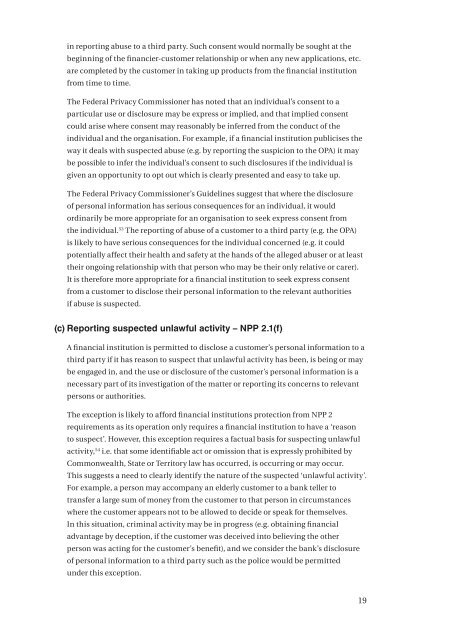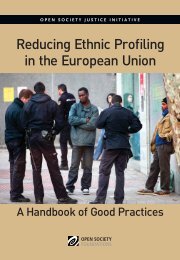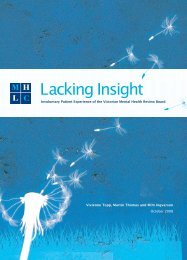Responding to the financial abuse of older people - Loddon ...
Responding to the financial abuse of older people - Loddon ...
Responding to the financial abuse of older people - Loddon ...
- No tags were found...
Create successful ePaper yourself
Turn your PDF publications into a flip-book with our unique Google optimized e-Paper software.
in reporting <strong>abuse</strong> <strong>to</strong> a third party. Such consent would normally be sought at <strong>the</strong><br />
beginning <strong>of</strong> <strong>the</strong> financier-cus<strong>to</strong>mer relationship or when any new applications, etc.<br />
are completed by <strong>the</strong> cus<strong>to</strong>mer in taking up products from <strong>the</strong> <strong>financial</strong> institution<br />
from time <strong>to</strong> time.<br />
The Federal Privacy Commissioner has noted that an individual’s consent <strong>to</strong> a<br />
particular use or disclosure may be express or implied, and that implied consent<br />
could arise where consent may reasonably be inferred from <strong>the</strong> conduct <strong>of</strong> <strong>the</strong><br />
individual and <strong>the</strong> organisation. For example, if a <strong>financial</strong> institution publicises <strong>the</strong><br />
way it deals with suspected <strong>abuse</strong> (e.g. by reporting <strong>the</strong> suspicion <strong>to</strong> <strong>the</strong> OPA) it may<br />
be possible <strong>to</strong> infer <strong>the</strong> individual’s consent <strong>to</strong> such disclosures if <strong>the</strong> individual is<br />
given an opportunity <strong>to</strong> opt out which is clearly presented and easy <strong>to</strong> take up.<br />
The Federal Privacy Commissioner’s Guidelines suggest that where <strong>the</strong> disclosure<br />
<strong>of</strong> personal information has serious consequences for an individual, it would<br />
ordinarily be more appropriate for an organisation <strong>to</strong> seek express consent from<br />
<strong>the</strong> individual. 53 The reporting <strong>of</strong> <strong>abuse</strong> <strong>of</strong> a cus<strong>to</strong>mer <strong>to</strong> a third party (e.g. <strong>the</strong> OPA)<br />
is likely <strong>to</strong> have serious consequences for <strong>the</strong> individual concerned (e.g. it could<br />
potentially affect <strong>the</strong>ir health and safety at <strong>the</strong> hands <strong>of</strong> <strong>the</strong> alleged <strong>abuse</strong>r or at least<br />
<strong>the</strong>ir ongoing relationship with that person who may be <strong>the</strong>ir only relative or carer).<br />
It is <strong>the</strong>refore more appropriate for a <strong>financial</strong> institution <strong>to</strong> seek express consent<br />
from a cus<strong>to</strong>mer <strong>to</strong> disclose <strong>the</strong>ir personal information <strong>to</strong> <strong>the</strong> relevant authorities<br />
if <strong>abuse</strong> is suspected.<br />
(c) Reporting suspected unlawful activity – NPP 2.1(f)<br />
A <strong>financial</strong> institution is permitted <strong>to</strong> disclose a cus<strong>to</strong>mer’s personal information <strong>to</strong> a<br />
third party if it has reason <strong>to</strong> suspect that unlawful activity has been, is being or may<br />
be engaged in, and <strong>the</strong> use or disclosure <strong>of</strong> <strong>the</strong> cus<strong>to</strong>mer’s personal information is a<br />
necessary part <strong>of</strong> its investigation <strong>of</strong> <strong>the</strong> matter or reporting its concerns <strong>to</strong> relevant<br />
persons or authorities.<br />
The exception is likely <strong>to</strong> afford <strong>financial</strong> institutions protection from NPP 2<br />
requirements as its operation only requires a <strong>financial</strong> institution <strong>to</strong> have a ‘reason<br />
<strong>to</strong> suspect’. However, this exception requires a factual basis for suspecting unlawful<br />
activity, 54 i.e. that some identifiable act or omission that is expressly prohibited by<br />
Commonwealth, State or Terri<strong>to</strong>ry law has occurred, is occurring or may occur.<br />
This suggests a need <strong>to</strong> clearly identify <strong>the</strong> nature <strong>of</strong> <strong>the</strong> suspected ‘unlawful activity’.<br />
For example, a person may accompany an elderly cus<strong>to</strong>mer <strong>to</strong> a bank teller <strong>to</strong><br />
transfer a large sum <strong>of</strong> money from <strong>the</strong> cus<strong>to</strong>mer <strong>to</strong> that person in circumstances<br />
where <strong>the</strong> cus<strong>to</strong>mer appears not <strong>to</strong> be allowed <strong>to</strong> decide or speak for <strong>the</strong>mselves.<br />
In this situation, criminal activity may be in progress (e.g. obtaining <strong>financial</strong><br />
advantage by deception, if <strong>the</strong> cus<strong>to</strong>mer was deceived in<strong>to</strong> believing <strong>the</strong> o<strong>the</strong>r<br />
person was acting for <strong>the</strong> cus<strong>to</strong>mer’s benefit), and we consider <strong>the</strong> bank’s disclosure<br />
<strong>of</strong> personal information <strong>to</strong> a third party such as <strong>the</strong> police would be permitted<br />
under this exception.<br />
19
















